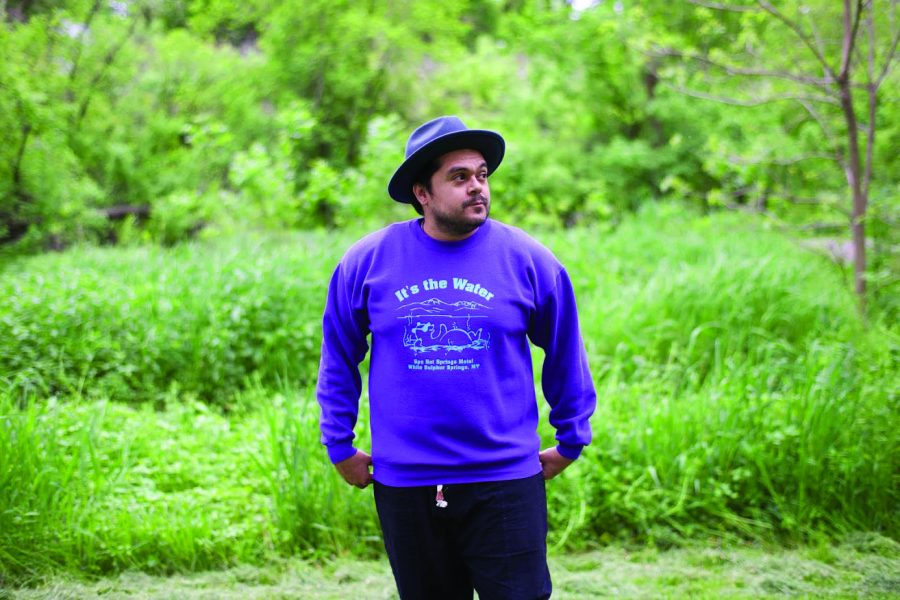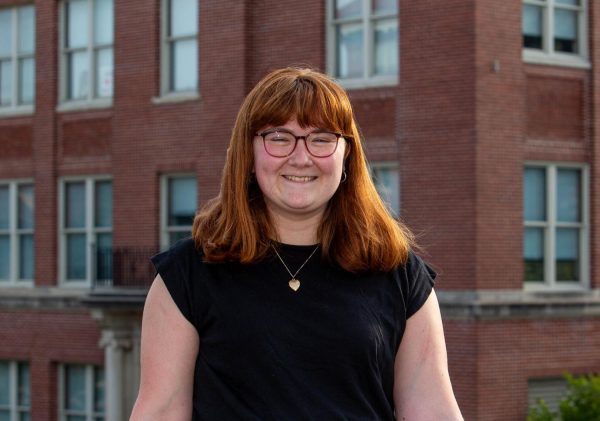An evening with storyteller Chuy Renteria
Chuy Renteria tells stories of family, friendships and culture with the backdrop of small-town Iowa. His visit to UNI brought a crowd of over 100 people.
Sep 28, 2022
Contribution by Mayra Villanueva, Spanish Editor
On the evening of Tuesday, Sept. 27, UNI Spanish Professor Elise DuBord introduced UNI’s most recent guest speaker saying, “Jesús ‘Chuy’ Renteria is an artist, writer, dancer, and teacher, but above all, he is a storyteller.”
Professors, students and members of the community gathered in Segebarth Auditorium in Sabin Hall to welcome Chuy Renteria, an Iowa writer and an Assistant Director for Inclusive Education and Strategic Initiatives with the University of Iowa’s Diversity, Equity and Inclusion office.
The event was held as part of UNI’s Latinx Heritage Month celebrations and was sponsored by the Department of Languages and Literatures, the Center for Diversity, Inclusion and Social Justice and UNIdos.
In his memoir, “We Heard it When We Were Young,” published in 2021, Renteria talks about his childhood with his friends and early adulthood through his own experiences growing up as Mexican-American in West Liberty, Iowa.
West Liberty is known as the first majority Hispanic town in Iowa, and the combination of Latinx, Laotian and white communities greatly impacted Renteria’s worldview, both as a child and an adult.
“We weren’t Mexican enough for the Mexicans and too Mexican for the white people,” he recounted during his presentation.
After a brief introduction, Renteria read a section from the first chapter of his book. His memoir talks in depth about the relationship with his father, an immigrant from a small village in Mexico. His mother is also an immigrant, but had a better transition to the U.S. than his father, who saw people die on his journey to Iowa.
His father first came to Iowa following people that he knew who talked about jobs that pay “actual paychecks.” He got a job in a meat processing factory, like many other immigrants did and still do.
Renteria spoke on the challenges present when trying to connect with others, even people you are related to by blood. A language barrier between his Spanish-speaking father and English-speaking Renteria, along with the weight of generational trauma often found in immigrant families, made his relationship with his father a very difficult one.
The racism that he and his friends experienced throughout their childhood is also a central piece to the story because it demonstrates how many people of color have experienced racism and continue experiencing it, especially in small-town Iowa.
After his lecture, there was a Q&A and his audience was able to ask questions about the process of writing and more about his experience navigating the world as a young child in the middle of everything and nowhere at the same time.
The presentation ended with a loud round of applause. The UNI Bookstore had his memoir for sale in the lobby, and Renteria signed copies for those in attendance.
Afterward, Renteria spoke with the Northern Iowan saying, “This visit has been amazing. It’s interesting to talk to different groups and have their different energy and to see what questions lead to other questions.”
“You can tell when you’re talking to folks that are connected to it in a way because they identify with it or they know people who identify with it because the questions, I think, get more real,” he said.
“I enjoy answering questions about the craft of it, but I feel like that becomes a bit of talking about writing for the sake of writing,” they said. “But we’re talking about people, we’re talking about real stuff. I really appreciate it when it’s something like this visit, where it is talking to people who are connected.”
“I am so excited that we had such a good turnout on Tuesday night,” Professor DuBord said. “We had over 100 people who came”.
“I also love that it’s such a good way for new students on campus to go to an event, hear an author speak and make connections maybe with someone they can identify with,” DuBord continued. “It is really an exciting experience, and to do that at the beginning of the school year too is great. It sort of sets the tone for getting involved on campus, which I’m really excited for.”
Renteria said that although he plans to continue promoting his book over the next few months, he is also striving for balance between his job and his role in relationships with friends and family.
He also hinted at future projects, saying that two additional manuscripts are in the works.
“We Heard it When We Were Young” can be purchased online and is available as an audiobook. Renteria’s work can also be read in “We the Interwoven: An Anthology of Bicultural Iowa: Vol. 1.”














